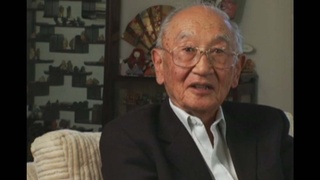Interviews
Fair Play Committee
Then they had a public meeting at one of the church building I think where the Associate editor of the Heart Mountain Sentinel, uh Nobu Tawai who was the former president of the JACL in Pasadena. He always gave everybody the same answer, Yes Yes to both questions. And at that time this older gentleman (Kiyoshi Okimoto) who I found out later was a solar chemist from Hawaii, got up and he was a member of the ACLU at that time and he was uh a rough rough talkin’ gentleman. He got up and said you know everybody should think about the uh your uh constitutional rights have all been pounded on you know stepped on says you have no rights. And he said to think twice about signing yes to these questions this and that. And some of us that were there felt that uh well he’s expressing the same kind of feelings that some of us. And at that time he was calling himself the Fair Play Committee of One, going around the camp you know, and when he could get a group he would talk to them about the Constitution. So some of us thought well this fella knows what he’s talking about and let’s get together with him. And we got together with him and talked and had some meetings and uh and he ended up having a Fair Play Committee of many you know, and organized.
Date: May 9, 2006
Location: California, US
Interviewer: Lisa Itagaki
Contributed by: Watase Media Arts Center, Japanese American National Museum
Explore More Videos

“Everybody went in like sheep”
(1913-2013) Doctor specializing in obstetrics in Southern California

The horror of Hiroshima after the atomic bombing (Japanese)
(1928 - 2008) Drafted into both the Japanese Imperial Army and the U.S. Army.

Finding out Roosevelt wanted Japan to attack
(1919-2020) Member of the 1800th Engineering Battalion. Promoted Japan-U.S. trade while working for Honda's export division.

Parents expected to be taken by the FBI
(1919-2020) Member of the 1800th Engineering Battalion. Promoted Japan-U.S. trade while working for Honda's export division.

525 Quartermaster Corps
(1919-2020) Member of the 1800th Engineering Battalion. Promoted Japan-U.S. trade while working for Honda's export division.

Fort McClellan soldiers
(1919-2020) Member of the 1800th Engineering Battalion. Promoted Japan-U.S. trade while working for Honda's export division.


Going to camp with the Terminal Island people
(1927-2010) Political Activist

The lawsuit set the standard for restoring people’s rights
(1927-2010) Political Activist


Interned at age fifteen, I saw camp as an adventure
(1927-2010) Political Activist




